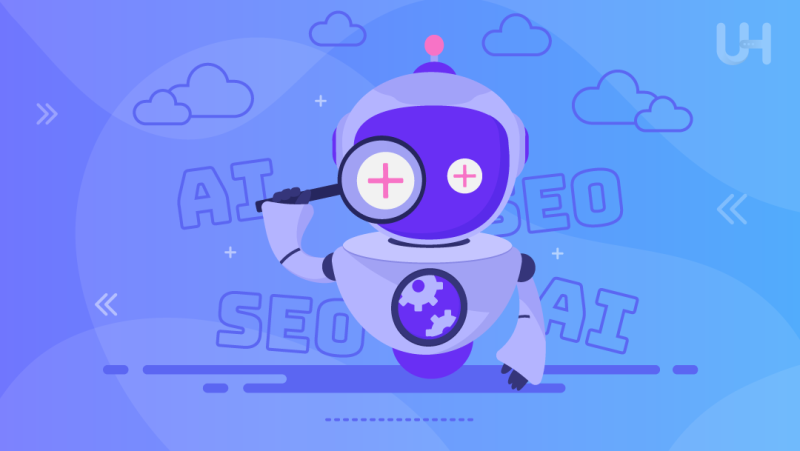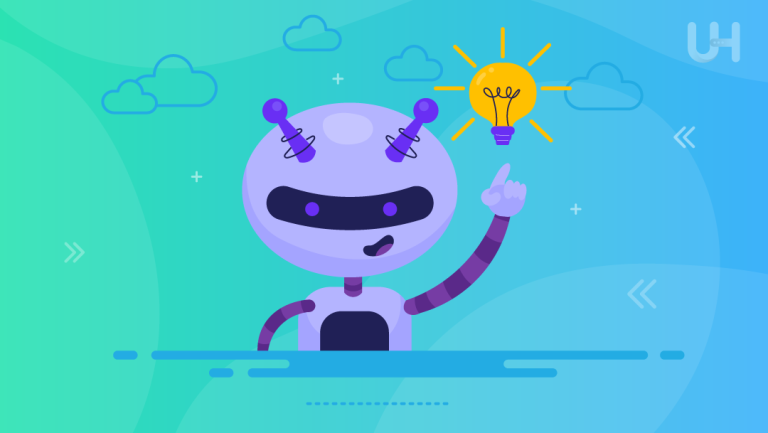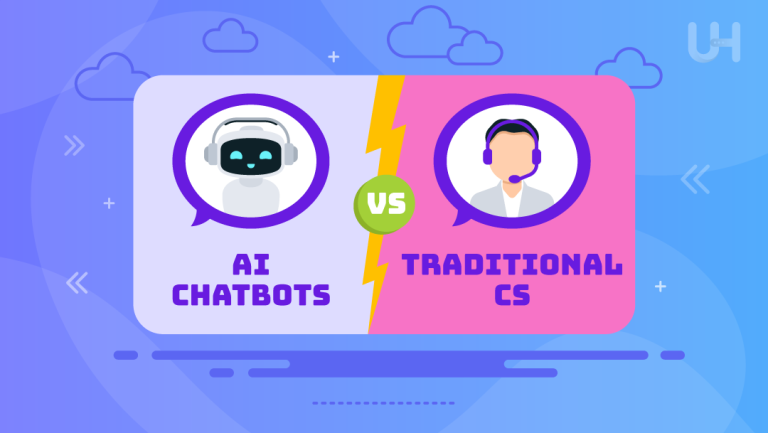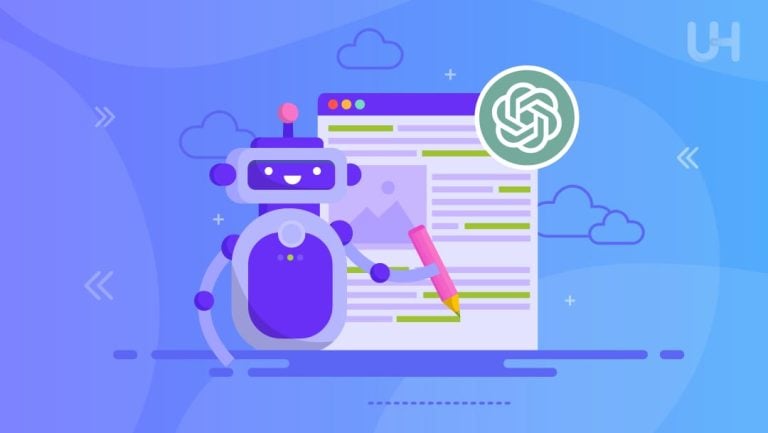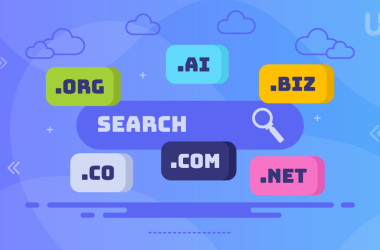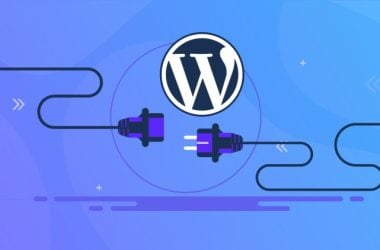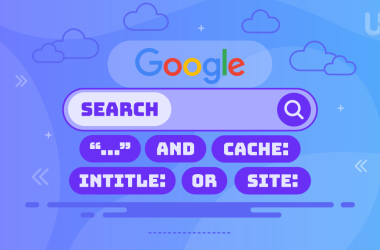Search engines are evolving faster than ever, and the driving force behind this change is Artificial Intelligence (AI). From personalized recommendations to real-time ranking updates, AI has become the invisible hand shaping how websites rise or fall on Google’s results pages.
But here’s the good news: AI is not the end of SEO it’s the evolution of it. By combining traditional optimization strategies with AI-powered insights, businesses can unlock unprecedented opportunities.
Key Takeaways
- AI is redefining SEO strategies in 2025 by focusing on search intent, natural language processing, and user experience.
- AI-powered SEO tools like SurferSEO, Clearscope, MarketMuse, Frase, and Semrush AI are transforming keyword research, content optimization, and competitive analysis.
- User experience metrics such as site speed, engagement, and readability are now critical ranking factors in AI-driven search algorithms. Reliable hosting providers like UltaHost help boost these signals by ensuring fast and secure websites.
- Challenges of AI in SEO include constant algorithm updates, over-reliance on automation, and high competition for quality content.
- The future of SEO belongs to a hybrid approach: combining AI-driven insights with authentic, human-written content.
Whether you’re running a small WordPress blog or managing an e-commerce giant, learning how AI influences SEO is the key to future-proofing your online presence. Search Engine Optimization refers to the process of improving the quality and quantity of the traffic to your website from search engines. Leveraging AI SEO services can help streamline keyword research, content optimization, and analytics to boost visibility faster and more efficiently. In this beginner-friendly guide, we’ll explore how AI is transforming SEO, the benefits and challenges it brings, and practical steps you can take to adapt.
How AI Revolutionizes SEO Practices
Artificial intelligence mainly revolutionized the way marketers handled SEO. It uses machine learning and natural language processing to provide much more meaningful insights into user behavior and search intent. Let’s drill deeper into how AI aids in keyword research tools, content optimization, and prediction, which drive tangible SEO results.
Unlock the Power of AI-driven SEO With Reliable VPS!
Is your website ready for the future of SEO? With UltaHost’s SEO-optimized VPS, you can leverage faster load times, reliable uptime, and seamless integration with AI tools. Enhance your AI and SEO strategies with a VPS built for performance and scalability.
Top AI Tools Transforming SEO in 2025
Here are the Top 5 AI tools that are transforming SEO in 2025:
SurferSEO – AI-Powered Content Optimization
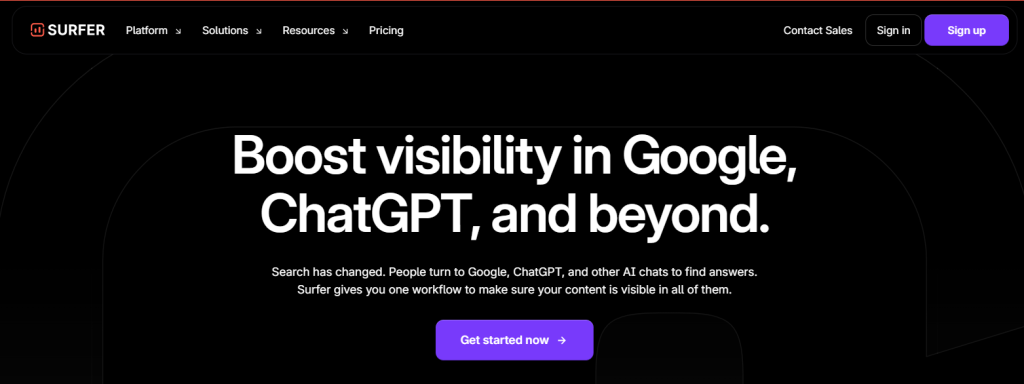
SurferSEO has become one of the most widely adopted AI-driven SEO tools because it blends keyword research, competitor analysis, and content scoring in one place. By analyzing top-ranking pages, it generates precise recommendations on word count, structure, and semantic keywords to improve rankings. In 2025, SurferSEO’s AI is even more advanced, offering predictive SEO features that suggest content updates before rankings begin to drop. For businesses looking to refine their on-page SEO, SurferSEO is a must-have tool.
Clearscope – Semantic Search and Readability
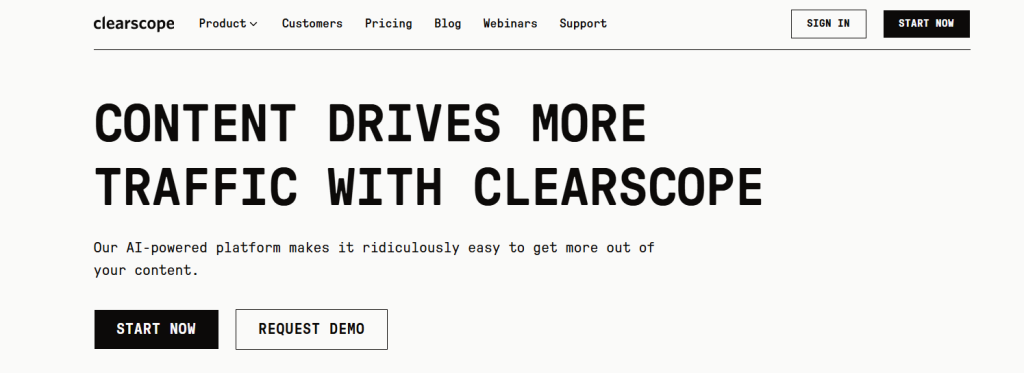
Clearscope is a leader in semantic SEO, helping marketers create content that aligns perfectly with how search engines interpret natural language. Instead of stuffing keywords, it guides you to use related terms and topics that AI algorithms expect in high-quality content. Its readability analysis ensures your content matches the audience’s reading level, improving engagement and dwell time. As search engines in 2025 prioritize user experience and contextual relevance, Clearscope gives writers the clarity they need to produce content that resonates.
MarketMuse – AI Content Strategy and Topic Modeling
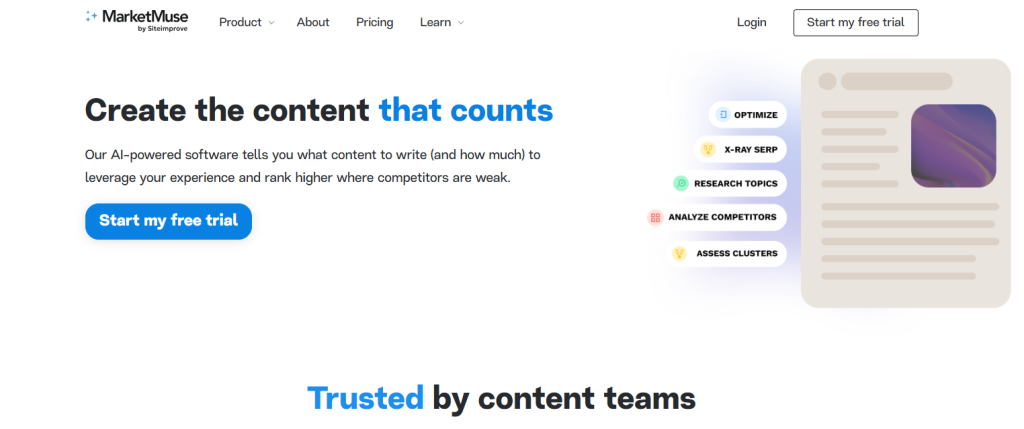
MarketMuse is designed for businesses that want to go beyond keyword optimization and build a comprehensive content strategy. Its AI-driven topic modeling identifies gaps in your site’s coverage and suggests pillar pages, supporting articles, and linking structures. This ensures that your website becomes an authority on a subject rather than relying on scattered blog posts. By 2025, MarketMuse has become a go-to tool for enterprise-level SEO teams who need scalable strategies backed by deep AI analysis.
Frase – Intent-Focused Content Creation
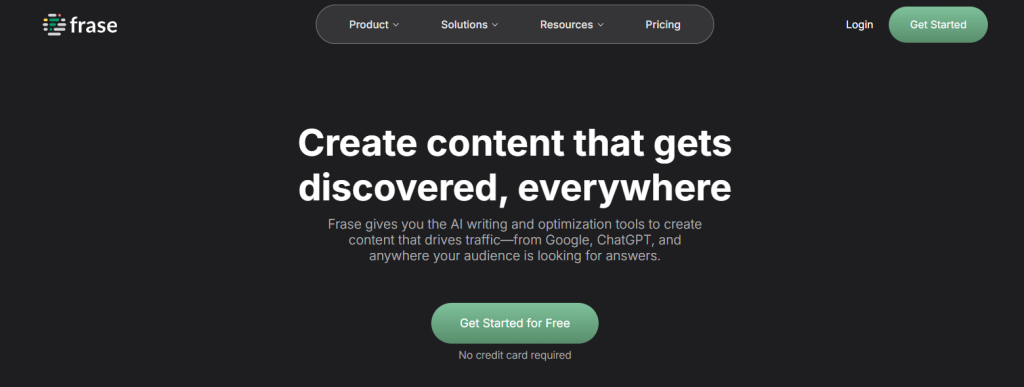
Frase is built for content creators who want to focus on user intent rather than just ranking signals. Its AI analyzes SERPs in real time, showing what competitors are covering and what questions users are asking. It then generates optimized outlines, FAQ suggestions, and AI-written drafts that can be polished by humans. This intent-first approach ensures your content directly addresses what searchers want. In 2025, Frase has become especially popular among bloggers and small businesses because it balances affordability with powerful AI-driven insights.
Semrush AI – Competitive Analysis and Keyword Intelligence
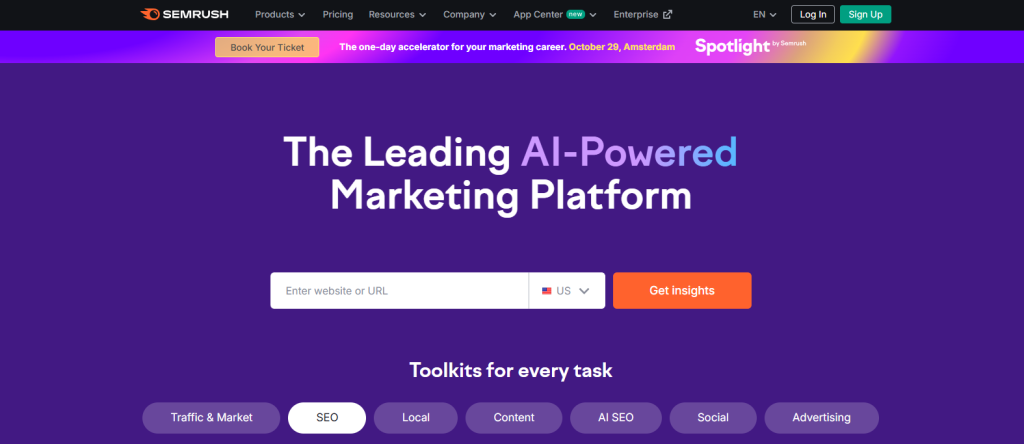
Semrush has always been a top SEO tool, and with AI integration, it has taken competitive analysis to another level. Its AI-driven keyword intelligence predicts search trends, helps identify low-competition opportunities, and offers real-time competitor tracking. The tool also provides content optimization recommendations similar to SurferSEO, but with the added benefit of deep backlink and PPC insights. By 2025, Semrush AI has evolved into a one-stop platform where businesses can manage SEO, content marketing, and competitive research under one roof.
Generative AI and SEO Strategies

This is turning out to be an element of change in the world of SEO; illustrated by different tools, generative AI is making content creation automated and seamless. It prepares all kinds of blog posts, from tailored ones to those optimized for voice search, opening new avenues for scaling digital marketing efforts more effectively. Let’s dive in and see just how generative AI can help you transform your approach while keeping quality and relevance consistent.
Automated Content Generation
Generative AI quickly scales content creation by automating repetitive tasks like writing product descriptions or questions and answers, making it an excellent complement to a blog hosting service. While this approach efficiently scales operations, businesses must carefully review AI-generated content for quality, originality, and adherence to value. Algorithms prioritize authentic content, and over-reliance on automation without proper oversight can lead to penalties.
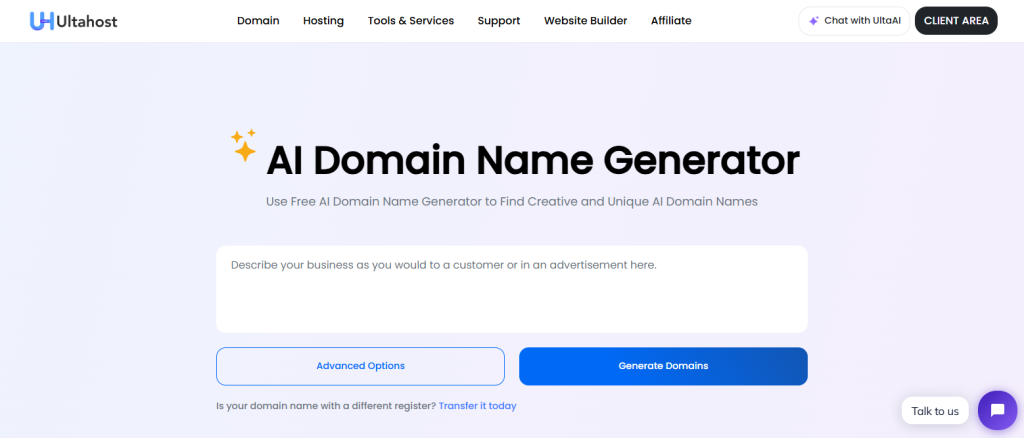
Voice Search Optimization
With the proliferation of voice-enabled devices, from smart speakers to voice assistants, voice search optimization has become a consideration with SEO. AI uses NLP to understand conversational queries, matching content with that language. That means long-tail keywords, taking actual answers to people’s questions, and making content match the patterns of spoken language.
AI-Driven Personalization and User Engagement

For instance, RankBrain, a Google algorithm, uses AI to make sense of what people say when using their voice to make a complicated query and return relevant results. Companies with AI-powered SEO strategies can better serve this ever-increasing search user segment.
In today’s competitive digital world, web developers learn about AI in order to use personalization strategies to increase end-users and performance.. AI tools make creating experiences for each user, setting up more engagement, and boosting SEO rankings easier than before. The section below describes how AI powers personalization and streamlines link building for greater effects.
Improved User Experience
Where AI shines through is in personalization, which is going to become crucial to SEO success. Teeming with user data such as browsing history and patterns of engagement, AI predicts what content visitors will appeal most to. This advances time-on-site metrics, cuts bounce rates, and improves rankings.
For example, Amazon and Netflix use AI to generate personalized recommendations, thus demonstrating that personalization enhances customer satisfaction and retention. Marketers can also duplicate these strategies in their own ways by using AI to perfect website navigation, recommend related content, and dynamically adjust pages to meet visitor preferences.
Link-Building Automation
AI makes the most time-consuming things in SEO, like link-building, easier. Tools such as BuzzStream enable you to automate finding the right websites, creating outreach emails for them, and managing responses. This saves time but enhances the quality of backlinks targeting highly relevant domains.
AI and SEO: Monitoring and Adaptation
SEO requires ongoing monitoring and the readiness and ability to change course as algorithms and user behaviors evolve. AI-driven tools let marketers track such performance metrics in real-time, predict future trends with uncanny accuracy, and make informed decisions. Let’s discuss how AI further extends intelligent decision-making and continuous optimization within the ever-changing SEO environment.
SEO Performance Monitoring
Screpy and NetFusion Technology are among the AI-driven platforms providing real-time SEO performance monitoring. Both analyze click-through rates, bounce rates, and conversion rates for actionable insights toward continuous improvement. This means that regular auditing and updating of AI-enabled SEO tools keeps strategic measures in step with changing search algorithms.
Predictive Analytics for SEO
AI analyzes the trend of user behavior based on historical data. The proactive approach enables a business to prepare itself for algorithm updates or changes in user preferences. Predictive website analytics will tell which keywords have just begun to emerge or which content formats could be about to take center stage. In this way, marketers can become one step ahead of their competitors.
Challenges in AI-Driven SEO
- Constant Algorithm Changes: AI-driven algorithms evolve rapidly, making it difficult for marketers to rely on the same strategy for long. Staying updated becomes a constant challenge.
- Over-Reliance on AI Tools: Many businesses lean too heavily on AI recommendations, forgetting the importance of human creativity. Over-automation can make content feel robotic.
- Data Privacy Concerns: AI thrives on data, but collecting and using it responsibly is a major challenge. Poor handling can damage brand trust and even result in penalties.
- High Competition for Quality Content: Since AI rewards valuable content, competition is stiffer than ever. Only the most insightful and authentic content gets ranked.
- Technical Complexity: Implementing AI-driven SEO strategies often requires technical expertise, making it harder for beginners and small businesses without resources.
Preparing for the Future of SEO and AI
As SEO transforms, new AI technologies such as NLP and ML will continue to amaze. While NLP helps search engines understand contexts better and improves search results’ relevance, AI-powered tools and the use of .ai domains for websites having automated content generation and monitoring performance will be more intelligent.
Marketers, however, need to take the lead in embracing such progressions and regularly rework their strategies. Investment in AI-powered tools that update trends will be important in staying competitive within an evolving digital landscape.
Conclusion
Artificial intelligence is the future of SEO: more efficient, personalized, and scalable. From keyword research to optimizing voice search, AI makes bringing high-octane content that best meets user needs easy. The balance between automation and human creativity and behavior with ethics will bring long-term success. In other words, flexibility and AI or SEO strategies will allow a business to survive the complications of modern search engines, setting up enduring digital visibility. Setting up an integration of AI or SEO is no fad but the future of digital marketing.
If you’re ready to prepare your site for the future of SEO, combining strong optimization practices with reliable infrastructure is key. With hosting providers like UltaHost, you can unlock faster load times, stronger security, and SEO-friendly performance that supports your AI-driven strategies.
A fast and reliable server is essential for optimal performance with AI-driven SEO strategies. UltaHost’s 10Gbps Dedicated Fast Server offers the speed and stability needed to power your website’s AI tools and boost SEO performance.
FAQ
How does AI improve keyword research for SEO?
AI identifies high-performing and long-tail keywords by analyzing trends and user intent, streamlining the keyword research process.
What is generative AI’s role in SEO content creation?
Generative AI helps create optimized content quickly, ensuring keyword usage and structure align with SEO best practices, though human review is still essential.
How does AI affect voice search optimization?
AI enhances voice search by using natural language processing to optimize for conversational queries and long-tail keywords.
What are the benefits of AI-driven personalization in SEO?
AI personalizes user experiences by analyzing behavior, boosting engagement and SEO performance by delivering relevant content.
Can AI tools automate SEO performance monitoring?
Yes, AI tools track SEO metrics like click-through and bounce rates in real-time, offering actionable insights for quick strategy adjustments.
How can AI enhance link-building for SEO?
AI automates link-building by identifying relevant sites and managing outreach for high-quality backlinks.
What challenges do marketers face when using AI for SEO?
AI can introduce biases in recommendations and requires balance with human creativity to ensure authenticity in content.





